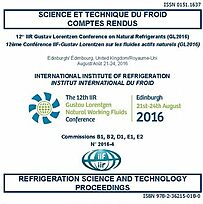
IIR document
Heat pump high density thermal storage (HPT) analysis: space heating, space cooling, and water heating.
Number: pap. 1058
Author(s) : KALINOWSKI P., MARTIN C., BURWELL M.
Summary
This work analyzed an air-source heat pump with an integrated adsorption thermal storage component for residential applications. The application of high density storage materials allows a building to meet its on-peak heating and cooling demands without interruption using thermal energy stored during off-peak hours. A simulation model was developed using Engineering Equation Solver (EES) to predict the performance of the system in five different climate zones: Chicago, San Francisco, Bern, Tokyo, and Miami. R134a and CO2 (R744) were considered as heat pump working fluids. The analysis was conducted assuming the heat pump would provide for space heating, space cooling, and hot water heating. The results show that thermal energy saved during offpeak hours can be applied during on-peak hours, effectively reducing the maximum electricity demand and annual utility costs. The CO2 heat pump system has a higher seasonal performance factor (SPF) than the R134a heat pump system due to higher compressor efficiency. Additionally, a cost-benefit analysis shows that the payback period for the thermal energy storage components strongly depends on an on-peak/off-peak electricity charge difference.
Available documents
Format PDF
Pages: 8 p.
Available
Public price
20 €
Member price*
Free
* Best rate depending on membership category (see the detailed benefits of individual and corporate memberships).
Details
- Original title: Heat pump high density thermal storage (HPT) analysis: space heating, space cooling, and water heating.
- Record ID : 30019142
- Languages: English
- Source: 12th IIR Gustav Lorentzen Conference on Natural Refrigerants (GL2016). Proceedings. Édimbourg, United Kingdom, August 21st-24th 2016.
- Publication date: 2016/08/21
- DOI: http://dx.doi.org/10.18462/iir.gl.2016.1058
Links
See other articles from the proceedings (140)
See the conference proceedings
Indexing
-
Heat pump high density thermal storage (HPT) an...
- Author(s) : KALINOWSKI P., MARTIN C., BURWELL M.
- Date : 2016/08/21
- Languages : English
- Source: 12th IIR Gustav Lorentzen Conference on Natural Refrigerants (GL2016). Proceedings. Édimbourg, United Kingdom, August 21st-24th 2016.
- Formats : PDF
View record
-
Performance analysis of a CO2 heat pump water h...
- Author(s) : YOKOYAMA R., KOHNO Y., WAKUI T., et al.
- Date : 2010/06/07
- Languages : English
- Source: ACRA2010. Asian conference on refrigeration and air conditioning: Tokyo, Japan, June 7-9, 2010.
- Formats : PDF
View record
-
Analysis of the ST-HP performance based on exte...
- Author(s) : HERVÁS-BLASCO E., NAVARRO-PERIS E., CORBERÁN J. M.
- Date : 2018/06/19
- Languages : English
- Source: CYTEF 2018. IX Congreso Ibérico y VII Congreso Iberoamericano de Ciencias y Técnicas del Frío, Valencia, España, 19-21 junio 2018.
- Formats : PDF
View record
-
Domestic hot water supply for multiple family d...
- Author(s) : VETSCH B., GSCHWEND A., BERTSCH S. S.
- Date : 2012/07/16
- Languages : English
- Source: 2012 Purdue Conferences. 14th International Refrigeration and Air-Conditioning Conference at Purdue.
- Formats : PDF
View record
-
Load modulation strategies of residential heat ...
- Author(s) : GEORGES E., LEMORT V.
- Date : 2016/07/11
- Languages : English
- Source: 2016 Purdue Conferences. 4th International High Performance Buildings Conference at Purdue.
- Formats : PDF
View record
